Angela recently purchased a membership to a brand new Christian-operated gym. “It’s really nice,” she shared with me. “My son goes there weekly to swim in the indoor pool.” As she told me a bit more I could tell that for her this gym was a good quality solution for her son’s summer break while he was out-of-school . She used the place a bit too, but she really hadn’t connected with it yet. It wasn’t her place to hang out.
I asked her if the Christian mission of the gym was evident to her. “No not really”, she replied. I pressed, “Well, I mean they might place a Bible near the entrance, have an inspirational poster on the wall or play Christian music.” She thought for a moment and then with widening eyes she responded, “You know, come to think of it, they don’t even play Christian music there. All I ever see is CNN on the televisions.”
This isn’t a made up story. It’s a real and candid account of one woman’s experience that reflects a critical deficiency in today’s culture. Christians are players in the world around us but they aren’t always being the life of Christ to others like they could. It’s evidence of why churches, Christian organizations, Christ-following businesses and professionals need to move beyond faith-based fitness and instead do faith-centered fitness.
This article was reprinted in the Christian Scholar’s Review so that Christian university leadership, faculty and students could gain insights and understanding toward living more Christianly in their daily lifestyle and vocation. Please support their effort by sharing it with those you know in university communities.
WHY ALL THE RIGHT THINGS STILL DON’T ADD UP
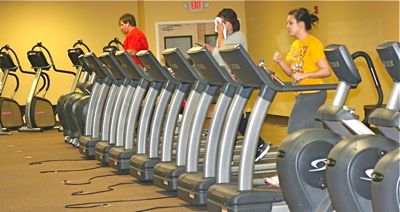 Let me be clear, this and many other Christian-operated fitness facilities and programs are doing things well. In many cases they’ve spared no expense. Often they have tremendous budgets with provisions in place to assure they can maintain that budget. Like the Bellaire Baptist Church Fitness Ministry they’ve invested in quality equipment, which is absolutely critical. They are located in an ideal location that is well researched. They staff with qualified professionals and committed volunteers and provide them with ongoing training. They provide programming and services that rival their secular competitors. They do the marketing, the legal, the safety, the maintenance and the affordable or sponsored/free memberships (especially if they are a non-profit). I should add that some of these also have growing memberships and positive public presence. As the Lego-Movie theme song goes, “Everything is awesome, when we’re living our dream.”
Let me be clear, this and many other Christian-operated fitness facilities and programs are doing things well. In many cases they’ve spared no expense. Often they have tremendous budgets with provisions in place to assure they can maintain that budget. Like the Bellaire Baptist Church Fitness Ministry they’ve invested in quality equipment, which is absolutely critical. They are located in an ideal location that is well researched. They staff with qualified professionals and committed volunteers and provide them with ongoing training. They provide programming and services that rival their secular competitors. They do the marketing, the legal, the safety, the maintenance and the affordable or sponsored/free memberships (especially if they are a non-profit). I should add that some of these also have growing memberships and positive public presence. As the Lego-Movie theme song goes, “Everything is awesome, when we’re living our dream.”

But when our accomplishments, good deeds, sincere pursuits, plans and hard work don’t keep God in the center then we’re missing our full potential. Jesus was more blunt, “Not everyone who says to me, ‘Lord, Lord,’ will enter the kingdom of heaven, but only the one who does the will of my Father who is in heaven. Many will say to me on that day, ‘Lord, Lord, did we not prophesy in your name and in your name drive out demons and in your name perform many miracles?’ Then I will tell them plainly, ‘I never knew you. Away from me, you evildoers!’”
His instruction certainly isn’t specific to how fitness ministry is done. However, it does challenge us to recognize our human tendency to shallowly base Christian identity on a few obvious qualities and feel that this indemnifies us from continually pursuing and fully executing God’s will. We’ve bought into a policy that we think gives us exemption from being obedient to a God with a mission. Faith-Based fitness recognizes that there is a spiritual component to physical fitness. It doesn’t equip a person to fully pursue God and make Him central to his or her life.
WHAT’S THE DIFFERENCE?
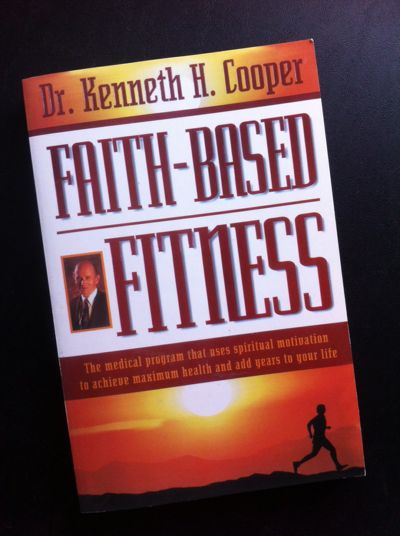
This conversation isn’t intended to criticize or make judgments. It’s for all those who sense a spiritual prompting that there is something more. Dr. Kenneth Cooper published the book Faith-Based Fitness in 1995. The “father of aerobics” is certainly one of the earliest users of the term. In his Faith & Fitness Magazine interview he shares, “The goal is to tell that our beliefs are one of the most powerful things we have. If we have strong beliefs, along with discipline, we can reach a level of ultimate fitness both spiritually and physically.” His books presents solid foundational concepts.
Over time, through the influence of popular culture, people have diluted and changed, to serve their own interpretation, some of the specifically Christian concepts that Dr. Cooper articulated. The result? “Faith-Based Fitness” for many has come to be a context for self-empowered enlightenment and positivity that feeds personal success. For others it’s simply a catch phrase easily dismissed as irrelevant.
For fitness to be effectively integrated with the Christian faith it is important to distinguish the difference between compromised concepts of what Faith-Based Fitness often mean and how Faith-Centered Fitness can build on simple concepts and approaches to create effectual fitness ministry. Take a look at what Faith-Based can imply and how Faith-Centered can transform fitness activity into life changing relationships and community.
COMPROMISED CONCEPTS OF WHAT FAITH-BASED FITNESS OFTEN MEANS

1. Built on a history of faith – similar to how some of the nation’s most notable universities have a history founded in the Christian faith but today have hardly any noticeable Christian influence and in fact are often undermining the Christian faith and providing a culture that is not spiritually strengthening. This is WOKE faith-based fitness.

2. Faith-Neutral – This approach to being Faith-Based is inclusive of many religions and as a result devalues Jesus Christ. This approach reinforces that Christians are not confident about what they believe and feel it has no greater value than any other faith. Those participating in such programming will unlikely be able to discover or learn what can make Christianity distinctly powerful or personal for him or her.

3. Faith-Friendly or Faith-Sensitive – Like putting on glasses that filter what you can see, fitness services that are Faith-Based in this context seldom offer any true spiritual nurturing. This environment simply makes efforts to remove offensive language, images, and programs that are questionable for the family market.
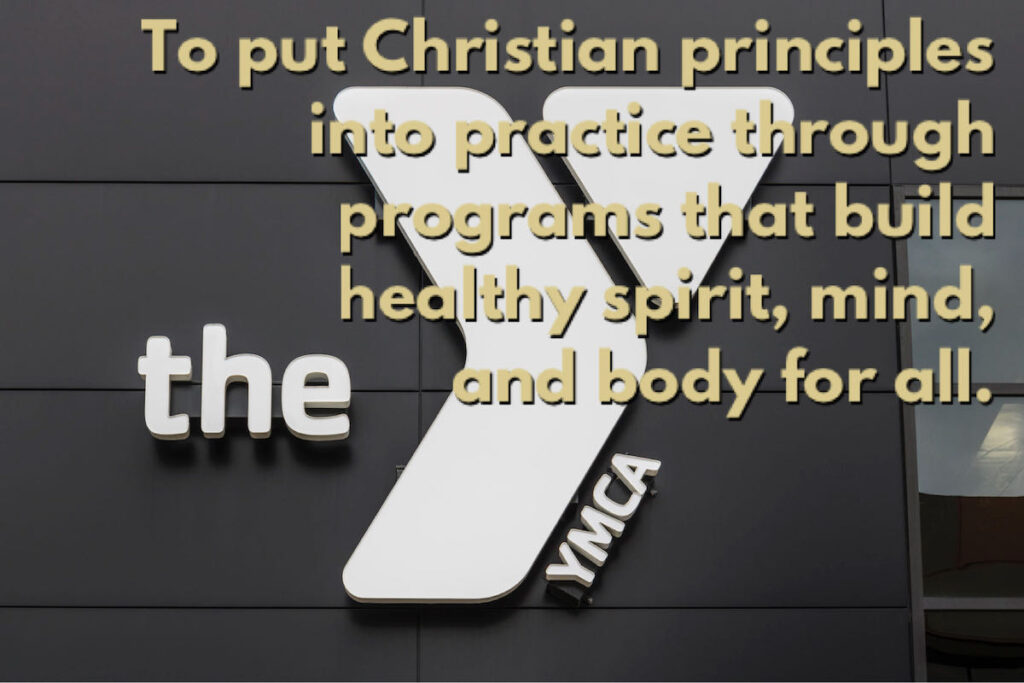
4. Faith-Principled – This Faith-Based approach is most commonly popularized at the Y where they promote “Christian values”. The confusion is that the values are shared by other faiths and by people with no faith at all. The damage is that the Christian faith becomes neutered. It is little more than a basis for a suggested environment.
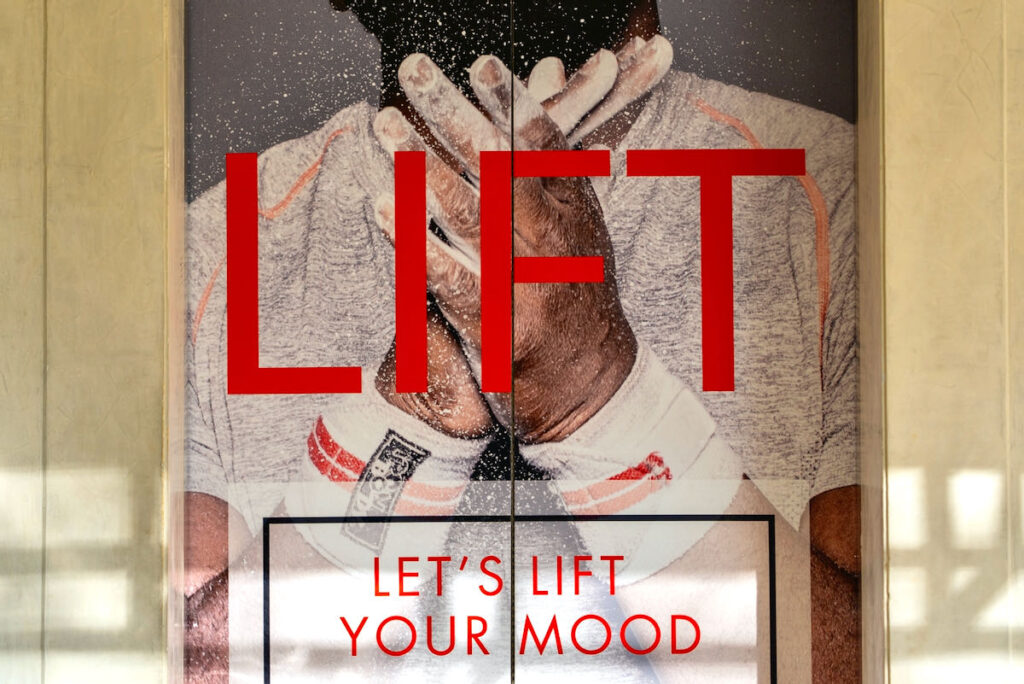
5. Faith-Lite – It’s as simple as putting on the wall a ‘good vibes’ poster right? Doing Faith-Based Fitness this way includes good efforts like playing Christian music in the gym or class, reading a Bible passage and praying before or after exercise, having a Bible on display, making motivational reminders available, offering a box for prayer requests, including a chapel space and other PASSIVE or relatively-passive initiatives. They are headed in the right direction but so much more is possible.
5 KEYS THAT MAKE A FITNESS MINISTRY FAITH-CENTERED
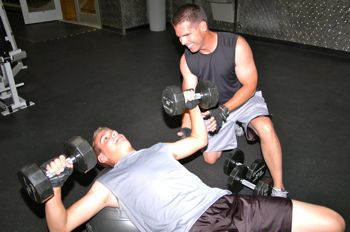
1. The Fitness Director is a pastor – This is absolutely one of the most critical shifts in thinking about the fitness ministry culture that needs to occur among Christians today. Churches view their fitness facility as a “back-door” for people to enter their church. This is a significant self-imposed limitation. Mike Daly’s pastor Dave Scott is also a personal trainer. He is one example of how pastoral and fitness roles integrated bring dynamic leadership to fitness ministry.
When Christians recognize that there are many people who will never go to a traditional church yet desire to experience and know God, then the fitness ministry can be developed and delivered to the community to BE church. Only when the leadership recognizes fitness ministry to be a complete new-testament church can they break free from their constraints and reservations and fully grow the ministry. The leadership in this capacity can lead their team to embrace the mission and provide them with the spiritual training needed to execute it.
This same state of thinking applies to Christian organizations, fitness facility owners and fitness professionals. If it helps to make the concept more clear the fitness ministry professional has two degrees; one in fitness and one in ministry. The fitness ministry professional is passionate about fitness and ministry both. A fitness ministry isn’t necessarily a sacred place but it certainly should be dedicated Christians coming together for fellowship and service to others.

2. Christ permeates the ethos and every aspect – It is possible and appropriate to respect and encourage diversity while at the same time promote and celebrate uniqueness. People won’t be offended instead they welcome it and anticipate it. In fact if you can’t help them identify what is distinct and of value about Jesus you send a confusing message.
Think of your favorite sports team. While everyone is welcome to be a fan, you would be jeered and booed if you set among the team’s fans and cheered for another team. What would be more odd would be if the team promoted another team and encouraged their fans to join them. Imagine going to Starbucks and not getting a totally Starbucks experience. A fitness ministry (actually churches in general) need to behave more like retail businesses. They need to focus on consistently having superior customer interaction — that intentionally communicates and demonstrates the fundamental Christian mission and continually reinforces the defining qualities that make it a unique destination.
Visit Disney World and you’ll have an experience where nothing is left to chance. They know you are there because you want what they have. A fitness ministry, a church or a Christian-owned business should do nothing less. A gym, wellness facility or training program is Faith-Centered when the leadership recognizes that faith is the defining value, the unique difference and the expected deliverable that customers want.

3. Ministry is being done – The word ministry means, “To give aid or service and meet the needs of others.” So, to do fitness as ministry requires a different attitude, a different agenda and an expanded set of resources.
The attitude is a mindfulness by leadership and staff that each person exercising, recreating, or participating in a program is in the midst of her or his own spiritual journey. Each person has an unmet need or a challenge to overcome. An opportunity for personal growth ultimately is a step toward helping a person satisfy a longing to mature in a personal relationship with God.
If a fitness ministry is going to help people achieve those goals then the facility, programs, services, amenities and indeed every person working/serving at the fitness ministry all need to facilitate and drive a ministry agenda.
Those leading a fitness ministry don’t just evaluate what equipment they have, what classes they offer or how well people enjoy the experience. Fitness ministry professionals engage an expanded set of resources. These resources can begin with something as simple as refining the use of facility media to intentionally communicate ministry mission, availability and inspiration. Establish and strategically place a library so people have easy access and are encouraged to use specifically selected Christian tools. Group classes and individual counseling are fitness ministry’s “Sunday School” and “pastoral preaching” transformed. Other ministries are connected into the fitness ministry to provide programs and services.

4. Members are “OTHERS MINDED” – There is an eagerness to be supportive of others and also expand the reach and influence of the ministry.
Churches and fitness ministries have nothing more important than to focus on each individual person’s spiritual life and create community fellowship. It begins from the moment each individual enters not only the first time but every time. It continues throughout the entire time the individual is within the facility and in the presence of the leadership, staff and members. It is residual beyond the visit – the impression so that the individual anticipates returning for more and wants to share it with OTHERS.
This approach to membership is foreign to most fitness businesses. In fact it is the antithesis to most club memberships that quite honestly want you to pay, play and go on your way (to make room for more). A Faith-Centered fitness ministry creates an environment that motivates members to truly find and create their “third place”. They go to work, they return to home but HERE they live and pursue interaction with others.
Is this what members want? Yes! The Dallas, Texas based Leadership Network did a study on small groups in churches (especially the mega-church) and produced a report titled Why You Should Care About Small Groups. People are drawn to the “big” but they return to and become part of the “intimate”. To understand this truth more read Rachel Held Evans opinion in the CNN Belief Blog. She says, “Millennials long for faith communities in which they are safe asking tough questions and wrestling with doubt.” Faith-Centered fitness ministry can be a faith community a modern-day church where the members — the church, take a primary role in pursuing together a spiritual wellness and a God-defined body/mind/spirit wholeness.
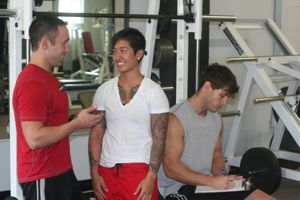
5. Spiritual growth is a measurable outcome – Good gyms, fitness programs, personal trainers and wellness services help people identify weaknesses and needs, define goals and strategies, implement processes, measure progress, make adjustments, celebrate successes and pursue lasting solutions and change in physical fitness, diet, wellness, agility, strength, body definition and more. A Faith-Centered fitness ministry is strategic to help members understand that physical improvements are only PART of total wholeness. The Faith-Centered fitness ministry elevates spiritual recovery and growth as the more critical component to lasting change and health.
When ministry is done on this level then members understand all the faith-centered focus they see. They will have buy-in to the spiritual examination process and be able to work toward measurable outcomes.
MOVING FROM NICE TO NECESSARY

The goal in transitioning from Faith-Based To Faith-Centered is to create a distinctly different environment and result. A fitness ministry has the ability to transcend the goals of a traditional fitness facility or service. It also has the ability to manifest Christians “the church” in a context that is powerfully engaged, compassionate, focused and at-work being life to others.
Faith & Fitness Magazine offers an introductory seminar for your church, business or group:
The Next Big Thing In Fitness – The Church!
Instead of being apologetic that the fitness facility is Christian move to celebrating faith as the defining benefit. Rather than owners, professionals, leadership and staff taking the high and easy road, “I’ll just let them see Jesus in me”, don’t be satisfied until you see Jesus in them. Having a charitable status with Christian-faith undertones for the purpose of being a non-profit falls way short of helping people to find their own personal relationship with Jesus Christ and growing a personal faith they will desire to share with others.

Faith-Centered fitness recognizes Christ is uncompromisingly central rather than being an additional base-component that subtly enhances physical fitness. You can bring Faith-Centered fitness to your community in your existing church fitness facility, at your gym or fitness/wellness service OR by launching a new initiative.
Find out more.
Contact ChurchFitness.com or CONTACT US.

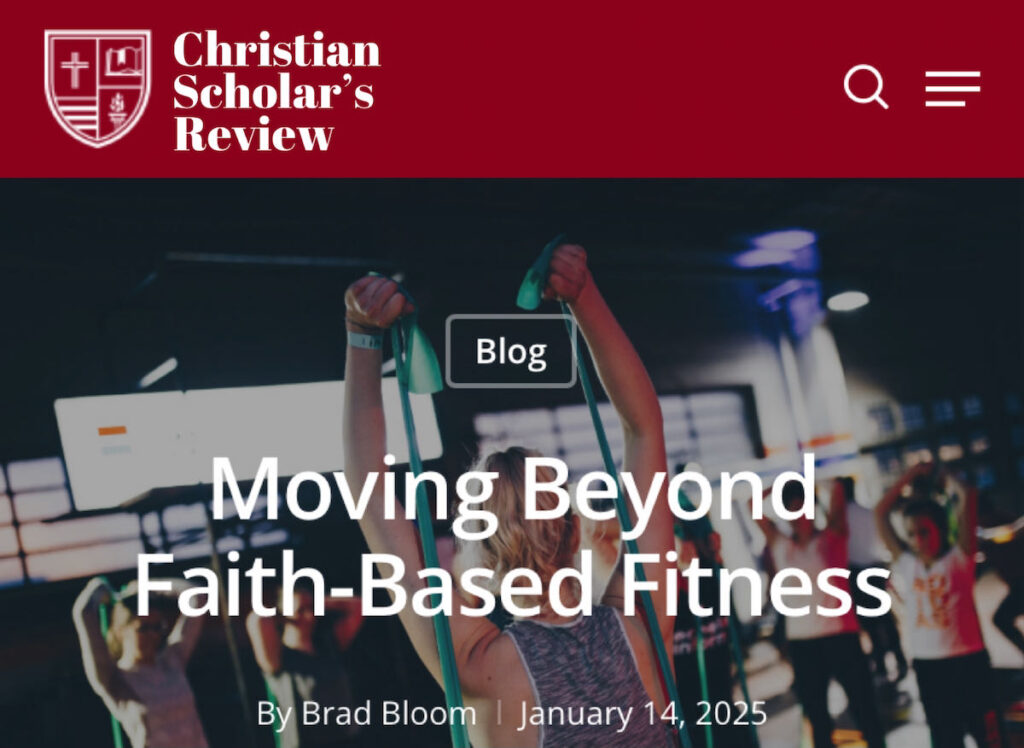

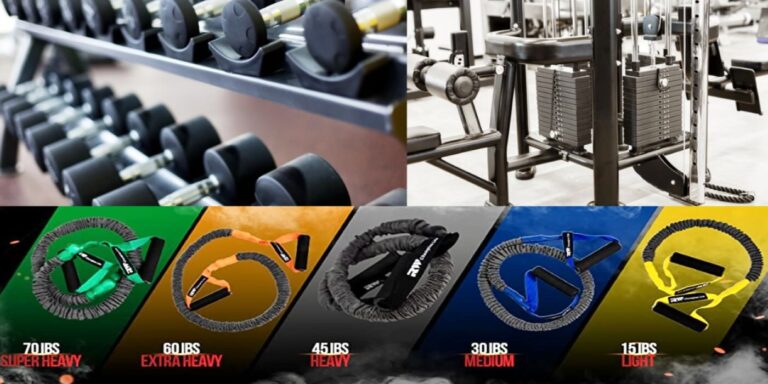



3 Responses
I am the author of 180 You Turn, A Biblical Approach to Wellness and Fitness Journal. Loved to link arms with you and help encourage others to care for the body God has given to us. I would love to share my e-book version with you! Please let me know if you are interested. Thank you for any considerations, my ultimate goal is to share what God put on my heart to write and see the church body well again.
https://www.westbowpress.com/en/bookstore/bookdetails/861838-180-you-turn